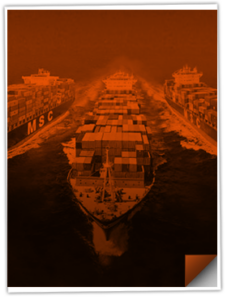UPDATE: Suez Attacks Delaying Cargo Shipments and Causing Shippers to Re-route CargoSuez Attacks Delaying Cargo Shipments and Causing Shippers to Re-route Cargo
- December 20, 2023
All major steamship lines have announced re-routings to avoid Houthi attacks in the Red Sea. Thus, many US-bound vessels will not be able to transit the Suez Canal and will be routed via the Cape of Good Hope around the African continent. While most announcements include mentions of a 10-14-day delays, we’d like to highlight some very likely resulting lowlights:
- Higher Rates. Ocean carriers have experienced a 300% increase in insurance costs, and they will endure a 20% increase in fuel usage. The distance around Africa is not only much farther, but vessels cannot slow steam since they will already be as much as two weeks late. Indications for Jan 1 spot rates call for a 100% rate increase (doubling) to the East Coast.
- Unreliable Schedules. First, the carriers will be late to reach the US or other destinations. Then, those same vessels, even if they are able to transit the Panama Canal, will be late to arrive back at origins. This will certainly lead to operational blank sailings.
- Equipment Shortages. Origins count heavily on backhaul arrivals to replenish empty containers. As those vessels take 2-4 weeks longer to return, it is not a question of if but when shortages will occur.
- Surcharges. In addition to higher base rates, we can expect more steamship surcharges to materialize.
- Future Service Strings. While shippers know that the steamship industry has what amounts to a crisis of capacity, it will be impossible for the carriers to add enough vessels to service strings to expand them enough to achieve the weekly sailings shippers rely upon today.
- West Coast Congestion. For shippers from Asia who can afford it, the US West Coast offers a canal-free routing, but the US rail system is not prepared for a significant volume spike, and ocean carriers will be loath to allow their valuable equipment to transit the US rails from West to East (and perhaps back again). Watch your wallets, readers!
Shapiro will continue to monitor the situation and provide status updates as they become available.
If you would like to speak with an expert regarding the potential impact to your cargo, please contact us!



